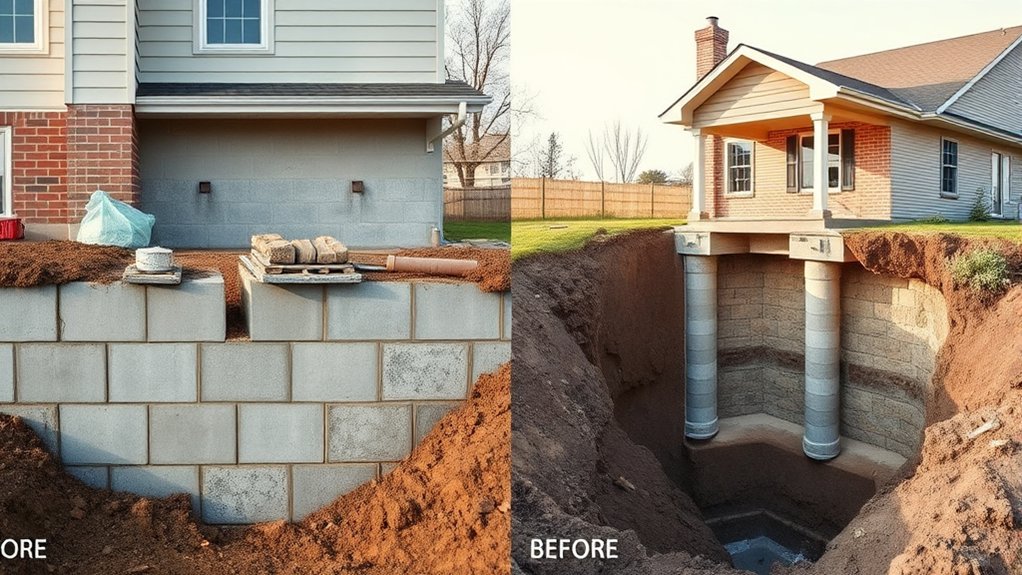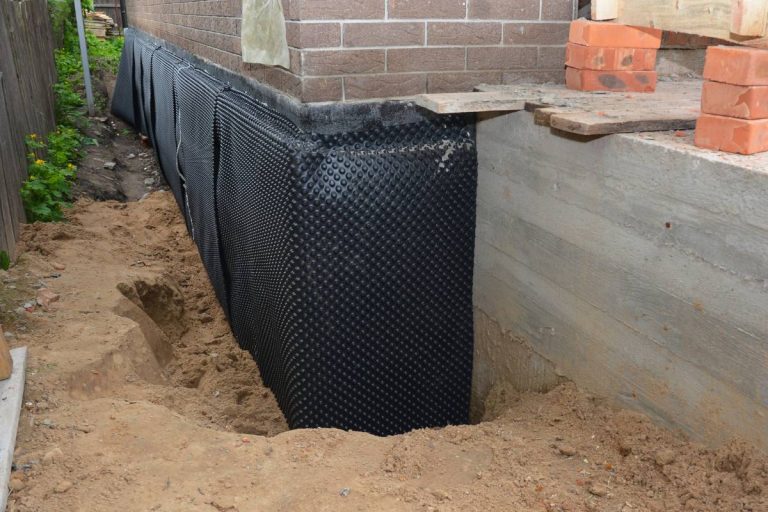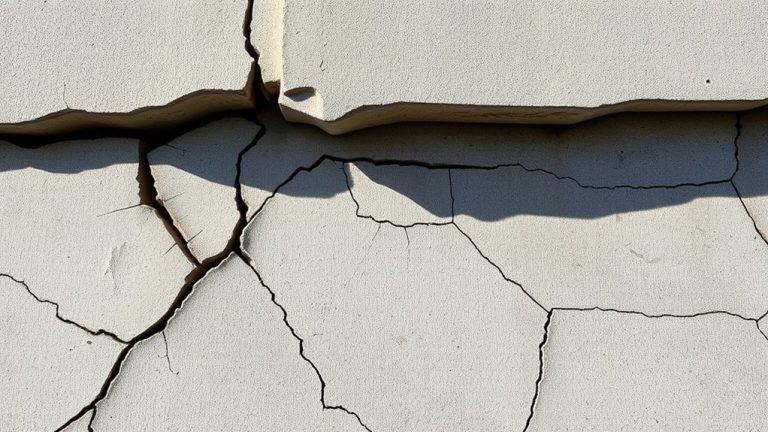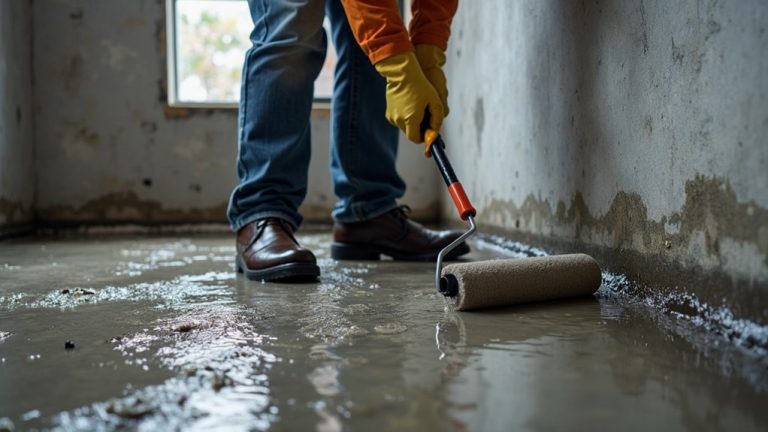Your home's foundation can be its silent guardian or its hidden threat. When cracks appear and shifts become noticeable, you'll face a critical decision: repair or replace? Each option carries significant implications for your property's structural integrity and long-term worth. Understanding the subtleties between foundation repair and replacement isn't just about fixing a problem—it's about safeguarding your most precious asset. Are you ready to discover the best path forward?
Key Takeaways
- Foundation repair is recommended when damage is localized, minor, and structural integrity remains mostly intact, typically involving targeted interventions like pier installation or soil stabilization.
- Full foundation replacement becomes necessary when extensive structural compromise exists, including repeated failures, significant soil movement, or damages exceeding 50% of the foundation's original condition.
- Cost considerations should evaluate both immediate repair expenses and potential long-term implications, comparing short-term fixes against comprehensive replacement that might preserve overall home value.
- Professional assessment is critical in determining the most appropriate solution, requiring expert evaluation of soil conditions, damage extent, foundation type, and structural engineering recommendations.
- Strategic decision-making involves analyzing factors such as home age, foundation type (concrete slab or pier and beam), severity of structural issues, and potential future maintenance requirements.
Understanding Foundation Damage Types
When foundation problems arise, they can quickly become a homeowner's worst nightmare. Different types of foundation damage stem from soil composition and load bearing capacity issues. Foundation inspection services can help diagnose the extent and severity of structural damage.
You'll want to recognize signs like horizontal wall cracks, uneven floors, or shifting doorframes, which could indicate serious structural problems. Concrete slab foundations might experience different stress points compared to pier and beam foundations.
Understanding these damage types helps you make informed decisions about repair strategies. Knowing whether you're dealing with minor settlement or major structural compromise can save you significant time and money in the long run.
Signs You Need Foundation Intervention
Recognizing foundation problems early can save homeowners thousands in repair costs. Your home's structural integrity depends on catching warning signs before they escalate into major issues. Foundation support systems play a crucial role in preventing structural damage that can compromise your home's stability.
Critical signs you'll want to watch for include:
- Cracked walls spreading vertically or diagonally
- Shifting floors creating uneven walking surfaces
- Doors and windows that stick or won't close properly
- Visible foundation cracks wider than 1/4 inch
- Moisture or water pooling near foundation edges
Don't ignore these signals. Acting quickly can prevent extensive damage and preserve your home's value and safety.
Exploring Repair Methods and Techniques
If foundation damage has caught you off guard, understanding your repair options can help you make an informed decision. Soil stabilization techniques like hydraulic lifting and chemical injections can effectively address minor foundation issues.
Procedures involving extending your foundation's depth or width might be necessary for more significant structural challenges. Professionals can assess whether helical piers, steel push piers, or concrete pilings will best stabilize your home's foundation. Your choice depends on soil conditions, damage extent, and budget considerations. Each method offers unique benefits, so consulting an expert is vital.
Comprehensive Overview of Full Foundation Replacement
Although foundation replacement represents a significant home improvement project, it's sometimes the most effective solution for severe structural damage. A detailed structural analysis helps determine if replacement is necessary, evaluating long-term stability assessment factors that impact your home's integrity.
Key considerations for foundation replacement include:
- Extensive structural compromise
- Repeated foundation failure
- Significant soil movement
- Cost-effectiveness of repair
- Potential home value preservation
You'll want professional competence to guide your decision, ensuring you're making the most informed choice for your property's future. The goal is protecting your home's stability and your family's safety with a thorough, strategic approach.
Cost Analysis: Short-Term vs. Long-Term Financial Implications
Foundation repair and replacement costs can dramatically impact homeowners' financial planning, often presenting complex economic challenges. When undertaking a cost benefit analysis, you'll need to weigh immediate expenses against potential long-term budgeting implications.
Short-term repair might seem cheaper initially, but could lead to more expensive problems down the road. Thorough replacement, while costlier upfront, might prevent recurring maintenance expenses and structural damage. Your decision should balance current financial constraints with future home value preservation.
Careful evaluation of your specific foundation's condition, structural integrity, and repair history will help you make the most financially judicious choice for your unique situation.
Evaluating Structural Risks and Home Safety
Beyond financial considerations, evaluating the structural risks and safety implications of your home's foundation demands careful attention. A thorough home safety inspection can reveal critical insights into your foundation's condition and potential vulnerabilities.
Key structural integrity analysis factors include:
- Visible foundation cracks
- Uneven floor surfaces
- Water drainage patterns
- Soil moisture levels
- Structural shifting indicators
Understanding these risks helps you make informed decisions about repair or replacement. Your home's safety isn't just about immediate fixes, but long-term structural stability. By proactively addressing foundation issues, you're protecting your most significant investment and ensuring your family's security.
Professional Assessment: When to Consult an Expert
When traversing intricate foundation problems, you'll want to seek professional know-how to guarantee precise diagnosis and efficient solutions. An extensive pre-repair inspection by a qualified contractor can reveal hidden issues that might escape an untrained eye.
You'll need experts who understand structural complexities and can accurately assess potential damage. Look for contractors with verified credentials, extensive experience, and solid reputation in foundation assessment. They'll provide thorough evaluations, recommend appropriate interventions, and help you make informed decisions about repair or replacement strategies that protect your home's integrity and value.
Making the Right Decision: Factors to Consider
After consulting professionals about your foundation's condition, you'll need to weigh multiple strategic factors before deciding between repair and replacement. Your decision will greatly impact your home's structural integrity and potential resale value.
Key considerations include:
- Total repair costs
- Age of your home
- Extent of foundation damage
- Long-term structural implications
- Potential home value considerations
When evaluating replacement versus repair, remember that your choice affects not just immediate expenses, but also future resale market impact. Carefully analyze each option's pros and cons, ensuring you make an informed decision that protects your most prized asset: your home.
Frequently Asked Questions
How Long Does a Foundation Repair or Replacement Typically Take?
Your foundation repair can take 2-3 days, while a full replacement might stretch 1-2 weeks. Your timeline depends on damage complexity, home size, and repair method chosen.
Can I Live in My Home During Foundation Work?
You can often stay home during repairs, but expect interrupted daily activities. Minor repairs usually allow ongoing home occupancy, while extensive work might require temporary relocation for safety and efficiency.
Will Foundation Issues Affect My Property's Resale Value?
Foundation issues can markedly drop your home's resale value. You'll want to address problems quickly, as unresolved structural concerns will scare potential buyers and reduce your property's market price.
Are Foundation Problems Covered by Homeowners Insurance?
Most homeowners' insurance policies won't cover foundation repair costs unless the damage results from sudden, specific events like burst pipes. You'll likely pay out-of-pocket for most foundation issues.
Do DIY Foundation Repairs Ever Work Effectively?
DIY foundation techniques can help minor issues, but you'll need professional inspections to ascertain you're not concealing serious structural problems that could undermine your home's integrity and safety.



